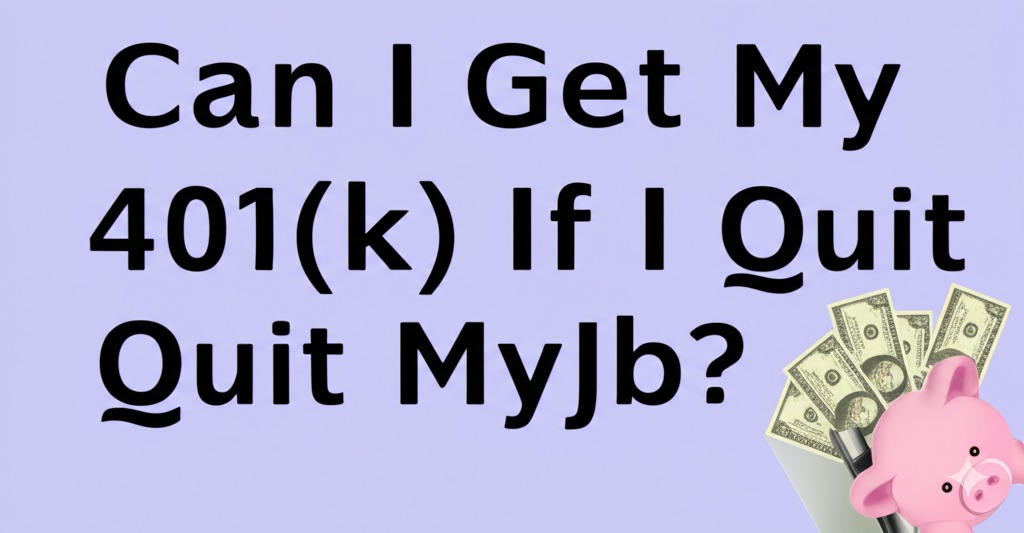
When you leave a job, whether by choice or not, one of the most important financial considerations is what to do with your 401(k). For many people, this retirement account represents years of hard-earned savings, and the decision on how to handle it after quitting can have long-term implications for your financial future. In this article, we’ll break down your options and guide you through the process of managing your 401(k) when you leave a job.
What Happens to My 401(k) When I Quit My Job?
First things first, you may be wondering: can I access my 401(k) if I quit my job? The answer depends on your situation and the type of 401(k) plan you have. Here’s what you need to know.
Can You Access Your 401(k) Funds Immediately?
Technically, you can access your 401(k) after quitting your job, but it’s important to understand the consequences. In most cases, the money in your 401(k) is meant to be used for retirement, and early withdrawals can come with penalties and tax consequences.
If you’re under the age of 59½, the IRS will typically impose a 10% early withdrawal penalty. On top of that, you’ll have to pay regular income tax on the amount you withdraw. While accessing your 401(k) funds is possible, it’s generally not the best idea unless you absolutely need the money for something urgent.
What Are My Options for Handling My 401(k) After Quitting?
When you leave a job, you usually have several options for what to do with your 401(k). Let’s explore the most common choices.
1. Leave It in Your Former Employer’s Plan
One option is to leave your 401(k) with your former employer. If the balance is over $5,000, the company is required to allow you to keep your money in their plan. This option may be ideal if you’re happy with the plan’s investment options and fees. However, it’s important to note that you can no longer contribute to the account once you’ve quit your job.
2. Roll It Over to a New Employer’s 401(k)
If your new employer offers a 401(k) plan, you may have the option to roll over your old 401(k) balance into the new account. This is a great way to consolidate your retirement savings into one account, making it easier to manage and track.
Rolling over your 401(k) avoids taxes and penalties, as long as the rollover is done properly. You also continue to benefit from tax-deferred growth.
3. Roll It Over to an IRA
Another option is to roll over your 401(k) into an Individual Retirement Account (IRA). IRAs often offer more investment choices and flexibility than employer-sponsored 401(k) plans. Plus, this can be a great way to ensure your money continues growing tax-deferred.
Rolling over your 401(k) to an IRA also avoids penalties and taxes, but it’s important to consider IRA fees and investment options before making this move.
4. Cash Out Your 401(k)
While it’s tempting to cash out your 401(k) for immediate use, this is usually the least recommended option. As mentioned earlier, you will likely face a 10% early withdrawal penalty if you’re under 59½, along with regular income tax. In addition, cashing out means you’re sacrificing your retirement savings for short-term needs, which can hurt you in the long run.
Factors to Consider When Deciding What to Do With Your 401(k)
There are several factors to take into account when deciding what to do with your 401(k) after leaving your job:
- Investment Options: Does the old plan offer a good selection of investment choices? Is your former employer’s plan cost-effective?
- Fees: Some 401(k) plans have higher fees than others, and these fees can eat into your long-term returns. Compare fees before making a decision.
- Age and Retirement Goals: Consider your age and how soon you plan to retire. If you’re young and still have many years until retirement, rolling over your 401(k) into an IRA or a new employer’s 401(k) plan may be the best move.
- Urgency of Accessing Funds: If you need access to your funds immediately, withdrawing your 401(k) might seem like an option. But consider the consequences of taxes and penalties.
Tax Implications and Penalties for Early Withdrawals
When you withdraw money from your 401(k) before the age of 59½, you’re typically hit with an early withdrawal penalty of 10%. On top of that, the amount you withdraw will be taxed as ordinary income, which could increase your tax bill for the year.
There are some exceptions to the early withdrawal penalty, such as in cases of permanent disability, substantial medical expenses, or if you leave your job after age 55 (known as the “Rule of 55”). But in general, it’s best to leave your 401(k) intact to avoid these penalties.
How to Avoid Mistakes When Managing Your 401(k) After Quitting
Handling your 401(k) after leaving a job can be tricky, but with careful planning, you can make the best decision for your financial future. Here are some tips to avoid common mistakes:
- Don’t Cash Out: While it might be tempting, cashing out your 401(k) is often a short-sighted decision. The penalties and taxes will significantly reduce the value of your savings.
- Consider a Rollover: Rolling your 401(k) into an IRA or a new employer’s 401(k) plan can help you avoid penalties and keep your retirement savings growing.
- Seek Professional Advice: If you’re unsure of what to do with your 401(k), it may be helpful to consult a financial advisor who can help you make an informed decision based on your unique situation.
Conclusion: Make the Right Move for Your Future
Quitting your job is a big life change, and deciding what to do with your 401(k) is a crucial step in ensuring your retirement stays on track. While you can access your 401(k) if you quit your job, it’s usually best to avoid early withdrawals due to penalties and taxes. Instead, consider rolling over your 401(k) into a new employer’s plan or an IRA to continue growing your savings tax-deferred.
By weighing your options and understanding the consequences of each choice, you can make the best decision for your long-term financial goals. If you’re unsure about what to do, seeking professional financial advice is always a wise move.

Andre Cuevas provides career insights, job search strategies, and professional advice to help individuals navigate the job market and achieve their career goals.






